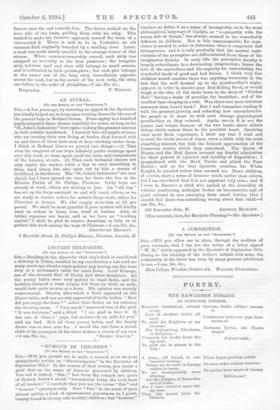"HUMOUR IN CHILDREN."
[To TRH EDITOR OP THE SPEOTATOH."] SIR,—Will you permit me to make a remark or so on your sympathetic article on " Struwwelpeter," in the Spectator of September 29th ? In the course of that article, you insist a good deal on the sense of humour possessed by children. You call it, indeed, " fun ; " but from the remark you quote of Sydney Smith's about "incongruity being the rock-basis of all humour," I conclude that you use the terms "fun" and " humour " synonymously. Now "fun," in the sense of pure animal spirits, a kind of spontaneous joyousness, is, I grant, largely found in (at any rate healthy) children; but " humour," whether we define it as a sense of incongruity, or in the more philosophical language of Carlyle, as a sympathy with the seamy side of things," has always seemed to me remarkably deficient in children. Nor is this unaccountable, for expe- rience is needed in order to determine what is congruous and incongruous; and it is only gradually that the mental regis- trations of the perceptive are differentiated from those of the imaginative faculty. In early life, the perceptive faculty is largely subordinate to a dominating imagination ; hence the love of the marvellous and the capacity for assimilating the wonderful deeds of good and bad fairies. I think very few children would consider there was anything humorous in the fact that the wolf dressed up in the grandmother's night- apparel, in order to deceive poor Red-Riding Hood, or would laugh at the idea of the three bears in the story of " Golden Hair" having a basin of porridge for breakfast; and of the smallest bear sleeping in a crib. Was there ever more delicious nonsense than Leer's book P But I well remember reading it with the greatest gravity, and reflecting how uncomfortable the people in it must be with such strange physiological peculiarities as they evinced. Again, surely it is not the quaint and unique humour of the two books about Alice's doings which endear them to the youthful heart. Speaking once more from experience, I must say that I read and re-read the books scores of times, when a child, with the most absorbing interest, but with the faintest appreciation of the humorous wealth which they contained. The Queen of Hearts and the Red Queen aroused my fearful admiration for their powers of repartee and acerbity of disposition; I sympathised with the Mock Turtle and pitied the Poor Hatter; and as for that Quixotic creation, the White Knight, he puzzled rather than amused me. Some children, of course, show a sense of humour much earlier than others, but I am convinced that it is not apparent very soon ; and if I were to discover a child who smiled at the absurdity of witches conducting midnight frolics on broomsticks, and of genii colossal in size emerging from small bottles, then I should feel there was something wrong about that child.—I am, Sir, &c., [How account, then, for Marjorie Fleming P—ED. Spectator.]






































 Previous page
Previous page